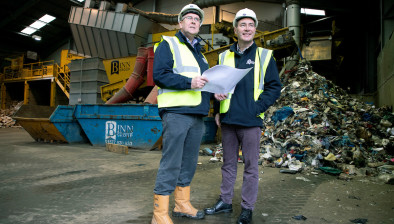Red Diesel policy ‘will add fuel to cost of living crisis and threaten sustainability’

Brian Ritchie
The Resource Management Association Scotland (RMAS), the organisation representing Scotland’s SME resource and waste management sector, has warned that plans to end the Red Diesel exemption for several industry sectors will further impact the UK’s cost of living crisis.
RMAS said the inevitable fuel price increases will drive up costs for its members with the impact ultimately trickling down to consumers. The organisation has also raised concerns that the ban on companies using the subsidised fuel could impact sustainability by driving up the costs of recycling and could lead to increased criminal activity from unscrupulous operators.
The UK Government’s proposals, due to come into effect in April, will result in a ban on the use of lowered-taxed Red Diesel in mobile, static and process plant and equipment for a number of industries. Waste management, construction and mining companies will be among the sectors impacted while agriculture, horticulture, fish farming and forestry sector operators will be exempt from the new rules.
While the Red Diesel ban is being promoted as a green policy to aid the transition to sustainable forms of fuel, RMAS says the lack of any viable alternatives will leave most waste and resource management companies reliant on white diesel, which will significantly increase operating costs.
A poll of the organisation’s 72 members suggests that costs will rise by around 15% with companies facing additional fuel expenses of between £100,000 and £400,000 per year. RMAS believes this could also have a detrimental impact on the environment as more illegal operators seek to undercut compliant businesses, leading to increased incidences of fly-tipping and other forms of illegal waste dumping.
The organisation is calling for a re-think on this policy urging ministers to delay the ban or provide additional support for the waste management sector, which was excluded from the UK Government’s £40m Red Diesel replacement competition announced last summer.
Brian Ritchie, chair of RMAS said: “The ban on Red Diesel comes with good intentions but it’s ill-conceived with no suitable green fuel alternatives available at present. Some of the estimated 15% cost rises facing our members will have to be passed down the line to customers, suppliers, and contractors. This will ultimately hit consumers further contributing to the current cost of living crisis in the UK.
“We call on the UK Government to re-think this flawed policy and either delay its implementation or provide additional support to offset its impact on the waste management sector and avoid the economic and environmental consequences that will inevitably follow.”
Highlighting the concerns of RMAS member companies, Robin Stevenson, managing director at Hamilton Waste & Recycling, added: “The forthcoming Red Diesel ban is being billed as a ‘green tax’ but it has the potential to be quite the opposite. Currently there aren’t viable alternatives to the diesel plant and machinery we rely on to transport, process and recycle waste on site. As a result, the only possible outcome is that this tax will increase the cost of recycling and therefore make it less appealing to waste producers.
“Our business is already 100% carbon neutral so this blunt form of taxation is only going to damage our ability to recover vital resources and unlock their environmental and commercial value.”





















